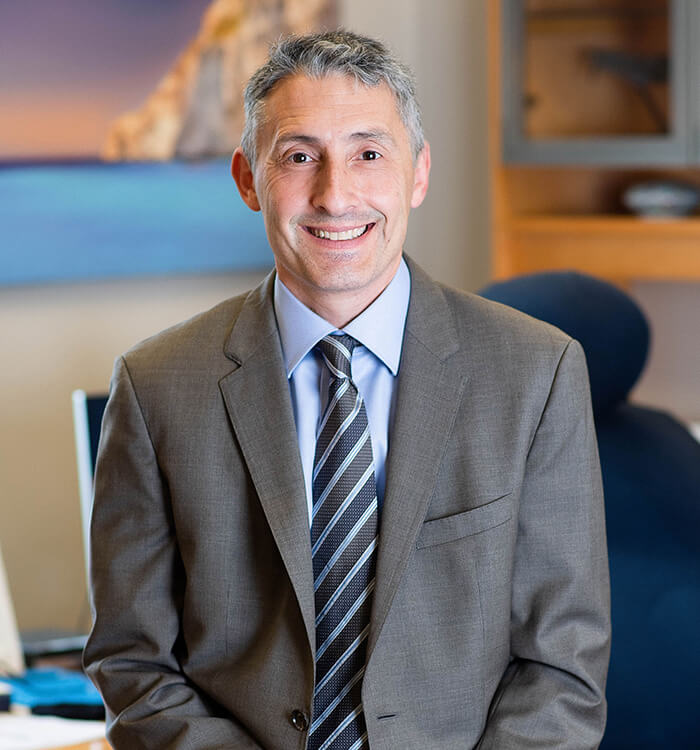UH Neurological Institute Update | Summer 2024
June 16, 2024
Innovations in Neurology & Neurosurgery | Summer 2024
Building on its storied history, the University Hospitals Neurological Institute continues to attract world-class faculty. Additionally, UH neurosurgeons and neurologists are frequently asked to share their expertise, welcoming physicians from around the globe and traveling nationally and internationally to share their latest innovations in surgical techniques and research initiatives.
"We are seeing the tip of the iceberg in terms of emerging technologies and treatment options in neurological medicine and are poised for significant advancements that will usher in a new era of patient care over the next five to 10 years,” says Nicholas C. Bambakidis, MD, Chair of the UH Department of Neurological Surgery, Director and Vice President of the UH Neurological Institute, and the Harvey Huntington Brown, Jr. Chair in Neurosurgery, University Hospitals
Recent UH Neurological Institute Highlights include:
Robotic-Assisted Neurosurgery
University Hospitals Cleveland Medical Center has recently acquired Zimmer Biomet’s ROSA ONE® robotic platform and navigational software. Developed for stereotactic neurosurgery, the robot supports biopsy, endoscopy, electrode placement and deep brain stimulation. This spring, specialists within the UH Neurological Institute began harnessing the robot’s state-of-the-art capabilities to plan and perform procedures.
“We completed our first case in April and were able to robotically place electrodes in the brain in a fraction of the time required using traditional techniques,” Dr. Bambakidis says. “This is just one example of how our expert faculty and advanced technology — including robotics — is making neurosurgery faster, safer and less invasive.”
Novel Alzheimer’s Drug Offered at University Hospitals
The UH Neurological Institute’s Brain Health & Memory Center is offering Leqembi® (lecanemab-irmb) to treat patients diagnosed with early Alzheimer’s disease who are experiencing mild cognitive impairment or dementia and elevated cerebral levels of beta-amyloid. Delivered via intravenous infusion, Leqembi received approval from the Food and Drug Administration in 2023 for appropriately selected individuals.
“This is a promising example of a therapeutic drug targeting a disease that has lacked treatment options,” Dr. Bambakidis says. “We are proud to offer this novel medication and give hope to patients and families throughout Northeast Ohio.”
Global Parkinson’s Study
University Hospitals was recently selected as a site for the Black and African American Connections Parkinson’s disease (BLAAC PD) study. The initiative of the Global Parkinson’s Genetics Program (GP2) is an effort to better understand the genetic basis of Parkinson’s disease among underrepresented populations. Researchers aim to genotype over 150,000 individuals from around the world. For more information, contact Camilla Kilbane, MD, Director of the Parkinson’s and Movement Disorder Center.
National Leadership and Collaboration
- In November 2023, the UH Department of Neurological Surgery hosted an exchange program with neurosurgery residents from Massachusetts General Hospital. Participants attended case discussions, toured UH facilities and rounded with UH residents. They also had the opportunity to meet with UH President and Chief Scientific Officer Daniel I. Simon, MD, and leaders within the UH Neurological Institute. A dinner with faculty and residents concluded the event.“
- Top neurosurgery programs around the world continue to send us their trainees to learn about the specialized skull base and cerebrovascular surgery we offer to our patients,” Dr. Bambakidis says. “The trust placed in our faculty speaks to the collective expertise within the UH Neurological Institute.”
- The UH Department of Neurology hosted the inaugural Chandar lectureship, named in honor of Emeritus Associate Professor of Neurology Krishan Chandar, MD.
- Dr. Bambakidis recently participated in visiting professorships at the University of California San Diego, Mass General Brigham’s Hospitals, Harvard University and The Ohio State University. In February, he was an invited speaker at the North American Skull Base Society Annual Meeting in Atlanta.
- In January, Krystal Tomei, MD, MPH, presented an oral abstract, A tale of two bullets: Management of migrating bullet fragments, at the American Society of Pediatric Neurosurgeons in Maui, Hawaii.
Faculty Highlights
- The SELECT2 research team, led by Amrou Sarraj, MD, will be honored with a 2024 Top Ten Clinical Research Achievement Award by the Clinical Research Forum. Honorees include physicians from the Mayo Clinic, Tufts University Medical Center and the University of Chicago.
- “Dr. Sarraj is the global principal director of a groundbreaking stroke study that is changing the paradigm for stroke treatment,” Dr. Bambakidis says. “This ongoing research will benefit a tremendous number of patients who experience acute ischemic stroke.”
- In January 2024, Michael D. Staudt, MD, MSc, joined the University Hospitals Neurological Institute as Director of Epilepsy Surgery and Co-Director of Pain Surgery and Neuromodulation. He holds the institute’s esteemed George R. and Constance P. Lincoln Endowed Chair.
- “Dr. Staudt was a fellow with us in 2016, and we were excited to recruit him back to join us,” Dr. Bambakidis says. “He is a superstar epilepsy and brain tumor surgeon and will be leading our robotic surgery epilepsy program.”
- Herbert Newton, MD, was named to the elite Top Doctors 2024 by The American Registry in the field of Neuro-Oncology, representing the top seven percent of doctors in the United States, as nominated by their peers.
- Steven Gunzler, MD, has received the designation of Fellow of the American Academy of Neurology (FAAN).
For more information, contact Dr. Bambakidis at Nicholas.Bambakidis2@UHhospitals.org or 216-844-8758.

Vice President and Director
University Hospitals Neurological Institute
Harvey Huntington Brown, Jr. Chair in Neurosurgery
University Hospitals Cleveland Medical Center
Professor
Case Western Reserve University School of Medicine


